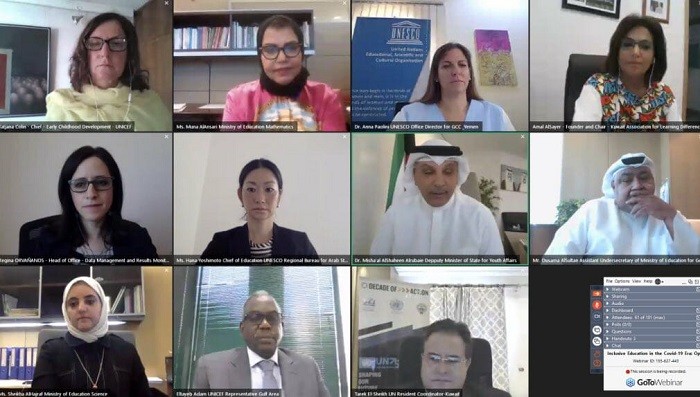The Office of the United Nations Resident Coordinator in Kuwait organized on Monday the first online symposium to discuss education issues during the COVID-19 crisis, in line with the UN Educational, Scientific and Cultural Organisation (UNESCO) office for the Gulf states and Yemen, as well as the UN Children’s Fund (UNICEF) for the Gulf region in Kuwait.
Representative of the UN Resident Coordinator in Kuwait Dr. Tarek Al-Sheikh said in a speech at the opening of the symposium that cooperation between the Kuwaiti government and the UN agencies in charge, UNESCO and UNICEF, aim to exchange experiences and studies drawn from challenges and talk about vital solutions regarding education during the pandemic.
Al-Sheikh added that this symposium coincided with the first celebration of the International Day to Protect Education from Attack, falling on September 9, in addition to the International Literacy Day on September 8, which was declared by UNESCO in 1966.
He explained that the symposium also aims to shed light on online education, with a primary focus on the youth. The Ministry of Education (MOE) aims to be a key player in achieving Kuwait’s 2035 Vision and the Incheon Declaration for Global Education 2030 in the best way, he pointed out. Meanwhile, MOEآ‘s Assistant Undersecretary for Public Education Osama Al-Sultan said in a speech during the symposium that the ministry developed a plan for online education, keeping pace with developments to ensure the continuity of learning.
The ministry carried out this experience for the 12th grade last August with the participation of public and special education students, which resulted in remarkable success from the beginning, through interaction in virtual classes, Al-Sultan noted. Accordingly, Undersecretary of the Ministry of State for Kuwaiti Youth Affairs Dr. Meshaal Al-Rabie spoke about the ministry’s experience in implementing national youth policy projects in light of the contagion. Several projects have been operated remotely through the Microsoft Teams application, including a project which aims to provide learning and training opportunities for young people in several skills, such as programming, robotics and mathematics, he explained.
Consequently, Dr. Anna Paolini, director of the UNESCO office in Doha, representing the Arab countries in the Gulf and Yemen, said in her speech that the disruption of the education process for more than 1.5 billion students in over 180 countries showed that no country is excluded, noting that even countries with enormous resources and high technical capabilities were not prepared to face all the challenges arising from the virus and the interruption of learning due to school closures.
In turn, UNICEF Representative in the Gulf Area Eltayeb Adam stressed in his speech the need for children to catch up through innovative and alternative educational tools. The symposium was attended by the UN officials, Kuwaiti government, teachers, students and stakeholders in the education field, with the aim of shedding light on the confusion within the education system that countries have not experienced before due to COVID-19. (end) aab.lr

